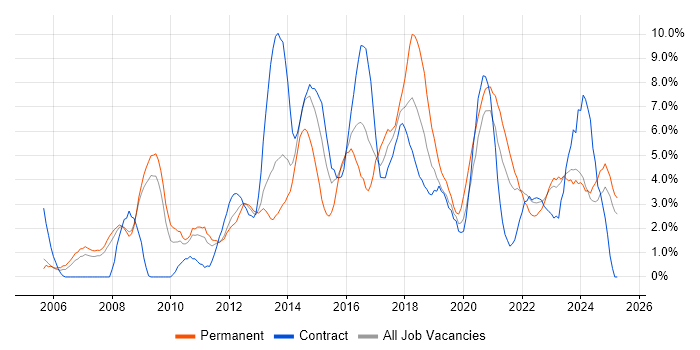Business Intelligence (BI)
Lancashire > Preston
The table below provides summary statistics for permanent job vacancies advertised in Preston requiring Business Intelligence skills. It includes a benchmarking guide to the annual salaries offered in vacancies that cited Business Intelligence over the 6 months leading up to 15 May 2025, comparing them to the same period in the previous two years.
| 6 months to 15 May 2025 |
Same period 2024 | Same period 2023 | |
|---|---|---|---|
| Rank | 40 | 27 | 32 |
| Rank change year-on-year | -13 | +5 | +3 |
| Permanent jobs citing Business Intelligence | 19 | 9 | 16 |
| As % of all permanent jobs advertised in Preston | 5.00% | 4.15% | 5.61% |
| As % of the Processes & Methodologies category | 5.01% | 4.52% | 6.13% |
| Number of salaries quoted | 4 | 5 | 13 |
| 10th Percentile | £40,607 | - | £41,250 |
| 25th Percentile | £45,156 | £33,500 | - |
| Median annual salary (50th Percentile) | £53,842 | £51,000 | £45,000 |
| Median % change year-on-year | +5.57% | +13.33% | -35.71% |
| 75th Percentile | £60,000 | £61,250 | £47,000 |
| 90th Percentile | - | - | - |
| Lancashire median annual salary | £47,683 | £45,000 | £45,000 |
| % change year-on-year | +5.96% | - | -18.18% |
All Process and Methodology Skills
Preston
Business Intelligence falls under the Processes and Methodologies category. For comparison with the information above, the following table provides summary statistics for all permanent job vacancies requiring process or methodology skills in Preston.
| Permanent vacancies with a requirement for process or methodology skills | 379 | 199 | 261 |
| As % of all permanent jobs advertised in Preston | 99.74% | 91.71% | 91.58% |
| Number of salaries quoted | 258 | 160 | 155 |
| 10th Percentile | - | £26,125 | £28,250 |
| 25th Percentile | £47,683 | £32,500 | £37,125 |
| Median annual salary (50th Percentile) | £50,055 | £47,000 | £43,800 |
| Median % change year-on-year | +6.50% | +7.31% | +9.50% |
| 75th Percentile | £55,000 | £57,500 | £51,875 |
| 90th Percentile | £59,081 | £62,500 | £64,500 |
| Lancashire median annual salary | £50,055 | £50,000 | £47,500 |
| % change year-on-year | +0.11% | +5.26% | +5.56% |
Business Intelligence
Job Vacancy Trend in Preston
Job postings citing Business Intelligence as a proportion of all IT jobs advertised in Preston.

Business Intelligence
Salary Trend in Preston
3-month moving average salary quoted in jobs citing Business Intelligence in Preston.
Business Intelligence
Salary Histogram in Preston
Salary distribution for jobs citing Business Intelligence in Preston over the 6 months to 15 May 2025.
Business Intelligence
Co-occurring Skills and Capabilities in Preston by Category
The follow tables expand on the table above by listing co-occurrences grouped by category. The same employment type, locality and period is covered with up to 20 co-occurrences shown in each of the following categories:
